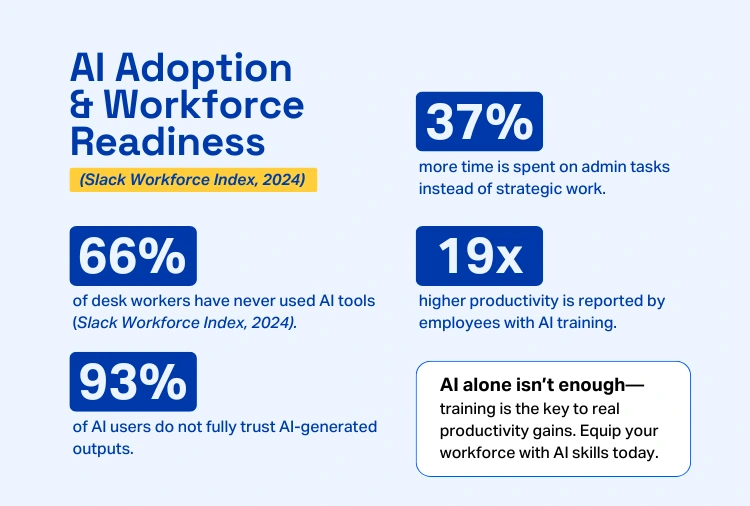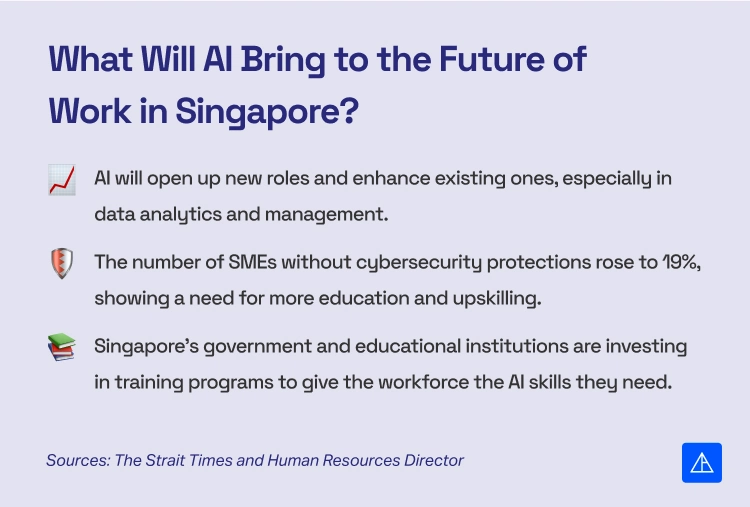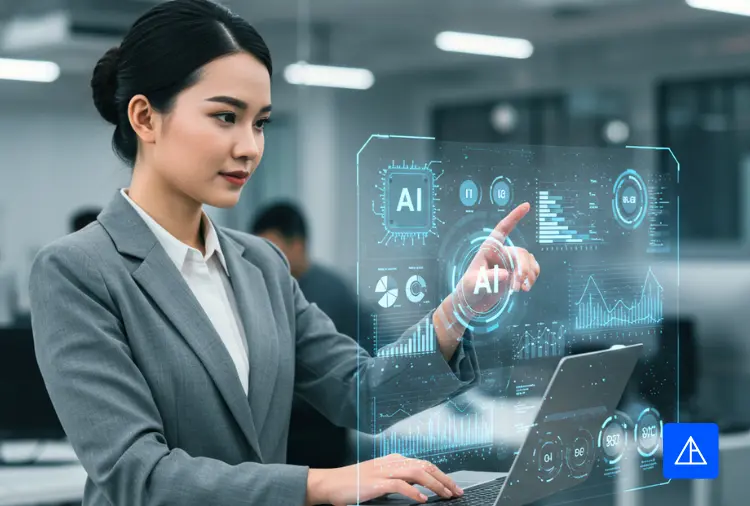AI adoption is accelerating, but many organisations are still unprepared. According to Slack’s Workforce Index (June 2024), over two-thirds of desk workers worldwide have yet to try AI tools, highlighting a major gap in adoption and training. Even among those using AI, 93% do not fully trust AI-generated outputs for work-related tasks, reinforcing the need for structured AI literacy programs.
However, the way AI is being used in workplaces raises concerns. Desk workers report spending a third of their time on repetitive tasks they see as low-value. Instead of shifting freed-up time toward higher-impact work like strategic planning or skill-building, many are devoting 37% more time to administrative duties. The real game-changer is training—employees with AI education are up to 19 times more likely to experience productivity gains from AI tools.

For business leaders, this presents a clear opportunity: AI adoption must go hand in hand with upskilling. AI risks becoming just another tool, rather than a business accelerator without proper training
This article examines the future impact of AI in the workplace, the challenges businesses face in AI adoption, and why upskilling is essential to building an AI-ready workforce.
Related Article: AI Basics: 15 Terms Every Beginner Should Know
How AI is Changing Workforce Dynamics

To stay competitive, businesses need to understand how AI is reshaping jobs and business operations. Here’s how these changes are shaping the workforce today:
1. Job Evolution, Not Just Automation
While AI is automating repetitive tasks, it’s also creating new opportunities. Roles in AI development, data science, and machine learning engineering are growing rapidly.
SkillsFuture Singapore’s Chief Skills Officer, Gog Soon Joo, highlights that AI will not simply replace jobs—it will enhance existing ones and create new demand in areas like data analytics and AI model management.
For businesses, this means:
✅ Strategic workforce planning is essential to balance automation with human expertise.
✅ Job redesign will play a key role in maximising AI’s value without displacing talent.
✅ Upskilling initiatives must go beyond basic digital literacy to cover AI-specific competencies.
2. AI Adoption in SMEs: Productivity Gains and Cyber Risks
Singapore’s small and medium-sized enterprises (SMEs) increasingly leverage AI to streamline operations, automate customer interactions, and optimise financial processes.
A report by QBE Insurance, a global insurer with a strong presence in Singapore, found that 49% of SMEs report increased productivity from AI adoption. However, 19% still lack protection against cyber risks, posing a significant challenge.
For SMEs, the priority is clear:
✅ Invest in AI literacy to help teams integrate AI into daily workflows.
✅ Strengthen cybersecurity measures to protect AI-driven systems from emerging threats.
✅ Leverage AI for business intelligence to drive smarter decision-making.
Related Article: Key Developments in AI for Cybersecurity Careers in Singapore
How to Prepare Your Workforce for an AI-Driven Economy
Building an AI-ready workforce demands a shift in skills, training, and strategic workforce development. Here are the key steps businesses must take to ensure their teams are ready for the future impact of AI in the workplace:
Reskilling and Upskilling
AI integration is reshaping the skills employers demand. Singapore’s government and institutions are investing heavily in AI training programs. An estimated 520,000 individuals underwent upskilling in 2023 through the SkillsFuture Initiative, according to a SkillsFuture report.
For business leaders, workforce readiness requires:
- Training employees to work alongside AI, not against it.
- Investing in skills that support AI implementation, such as data analytics, cybersecurity, and AI ethics.
- Encouraging cross-functional learning to ensure teams understand AI’s impact across departments.
AI Readiness
AI is not replacing jobs—it’s changing how businesses operate. Companies that invest in AI training and workforce development will gain a competitive edge, while those that delay may struggle to keep up.
To ensure your organisation is AI-ready, follow these steps:
✅ Evaluate AI Readiness
Assess your team’s current AI skills and identify gaps that need to be addressed.
✅ Invest in AI Training
Provide structured learning programs to equip employees with the skills to use AI effectively.
✅ Implement AI Strategically
Integrate AI tools into workflows to enhance productivity and innovation.
Related Article: Upskilling vs. Reskilling: Top 5 Differences for Career Success
💡 Ready to upskill your team? Take our AI career quiz and discover your AI potential.
GENERATIVE AI QUIZ
Unlock insights into how Generative AI can transform your career.
What are the Recommended AI-Driven Courses for Businesses and Professionals?
To stay ahead, leaders should prioritise these key training areas:
Executives and Decision-Makers
- AI in Business Strategy – Understand how AI aligns with corporate goals and drives business growth.
- Data Science for Business Leaders – Learn how AI-powered insights improve decision-making.
Employees Adapting to AI
- Python for AI – Build foundational coding skills for AI-powered applications.
- Data Analytics for Beginners – Learn how to interpret AI-generated insights for better strategic planning.
Cybersecurity and Compliance Teams
- Cybersecurity in AI – Mitigate AI-related risks and protect business data.
- Blockchain & AI Integration – Explore how AI and blockchain enhance security and transparency.
To bridge these skill gaps, Vertical Institute offers in-demand courses that equip professionals with AI-driven capabilities. Our programmes align with industry needs, ensuring individuals and teams gain practical, job-ready skills.
Whether you’re an executive shaping AI strategy, an employee integrating AI tools into daily tasks, or a cybersecurity professional managing AI-related risks, our corporate AI training empowers entire teams to stay competitive. Our expert-led programs help businesses future-proof operations, enhance productivity, and build an AI-ready workforce.
🚀 Enrol your teams at Vertical Institute and build a workforce that’s ready to thrive in an AI-driven economy.
Discuss your career goals, decide which course is the best for you and understand the government subsidies. 
Book a Free Consultation
Why Gen AI Training is Critical for Business Success
Generative AI has become a strategic necessity, with businesses using it to automate workflows, enhance customer engagement, and streamline decision-making. AI-driven solutions are improving efficiency and innovation, from generating reports and summarising data to creating personalised marketing content.
However, businesses must invest in workforce training to fully benefit from Gen AI. Many organisations adopt AI tools but do not provide employees with the skills to use them effectively. AI can lead to inefficiencies, poor implementation, and security risks without proper training.
Companies that prioritise Gen AI workforce training benefit from:
✅ Higher productivity
AI can automate repetitive tasks, allowing employees to focus on more strategic and high-value work that drives business growth.
✅ Better decision-making
Businesses can leverage AI-driven insights to make data-backed decisions, improve efficiency, and reduce risks.
✅ Improved customer experiences
AI-powered automation enables businesses to deliver personalized services, respond faster to customer needs, and enhance overall satisfaction.
✅ Stronger competitiveness
Companies that invest in AI upskilling can stay ahead of industry disruptions, adapt to technological advancements, and maintain a competitive edge.
🚀 Future-proof your workforce today. Enrol in our Gen AI course now.
Generative AI Course
Boost efficiency and enhance productivity using Generative AI.
FAQs on Preparing Your Workforce on AI
Conduct a skills gap analysis to identify training needs and areas for AI integration.
Digital Marketing – Use AI-driven strategies to create more effective online campaigns.
Data Science – Develop skills to make data-driven decisions and drive business growth.
Advanced Data Analytics – Master in-depth data analysis techniques and AI applications.
Data Analytics – Learn to interpret and apply AI-driven insights for better decision-making.
UI/UX Design – Design user-friendly digital experiences with AI integration.
Generative AI – Explore AI tools for automation, content creation, and innovation.
Cybersecurity – Identify AI-related risks and implement strong security measures.
Blockchain – Discover how AI and blockchain work together for secure, transparent solutions.
SMEs can access various subsidies to make AI workforce training more cost-effective:
SSG Subsidy – Covers up to 70% of course fees for eligible Singaporeans and Permanent Residents.
SkillsFuture Enterprise Credit (SFEC) – Provides up to 90% additional funding on remaining fees after subsidies.
Enterprise Innovation Scheme (EIS) – Offers a 400% tax deduction or a 20% cash payout based on net course fees.
Absentee Payroll (AP) – Helps businesses offset employee wages while they undergo training.
No, our courses cater to beginners and professionals, ensuring accessible learning paths for all skill levels.
Book a free consultation with our admissions team to discuss training needs and course options.
Conclusion
Investing in AI training today is not just about keeping up with technology; it is about securing long-term business resilience and growth. As AI tools evolve, employees will need to collaborate with AI, interpret AI-driven insights, and effectively apply AI solutions. Without these skills, businesses risk underusing AI, mismanaging its potential, and falling behind competitors.
The companies that will lead in an AI-driven economy prioritise workforce upskilling, integrate AI into workflows, and build AI-ready teams. The future workplace demands AI-literate employees, forward-thinking leadership, and a commitment to continuous learning.



